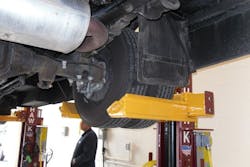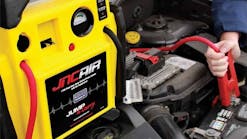Guest Blog: Mobile lifts: Raising trucks with dual rear tires
After years in engineering school, designers of manufacturers like Mack or Freightliner designed their trucks to go down the road with four tires on the rear axle. After the same years in grad school, the engineers of manufacturers like Michelin or Goodyear designed their tires to carry a maximum payload per tire. These days, when it comes to lifting vehicles with tires of this design you must be careful not to over pressurize them during the lifting process.
Many reading this may be using mobile column lifts. If so, ask yourself if you are lifting only on the outer tire? If it's a dump truck, transit bus, or fire truck being raised, you're likely over pressurizing the maximum tire load rating.
Several brands of mobile column lifts are available with 22" long forks which engage both rear tires on each side of a truck. These longer mobile column lifting forks are the safest way to raise dual rear end vehicles. Yet, you should be aware that when using 22" long forks, certain brands of columns derate the capacity from 18,000 lbs per column to just 12,000 lbs per column (autolift.org). Although, if the vehicles being lifted have a rear axle weighing more than 24,000 lbs - the combined capacity of the 2 rear columns - then you're overloading the columns and going over the manufacturer's rated safety capacity. Also, if you're only lifting by the outer tire, you're still over pressurizing the rated capacity of the outside tire, again going against the lift and tire company's warnings.
Some lift manufacturers offer mobile 22" long forks, but these longer lifting forks only decrease the capacity from 18,000 lbs to 16,000 lbs. Most axles aren't holding 32,000 lbs, so these higher rated long, mobile column forks represent a safer way to lift and service vehicles.
Mobile lifts have one and only one nationally recognized safety certification, and ignoring the manufacturers stated lifting capacities or the maximum PSI of the truck's tires being lifted is not following those safety guidelines.
Lift safely, and pay attention to all the details offered by all lift manufacturers and the stated maximum PSI load rating of all tires on the trucks you're lifting.
Information provided by: Mohawk Lifts



